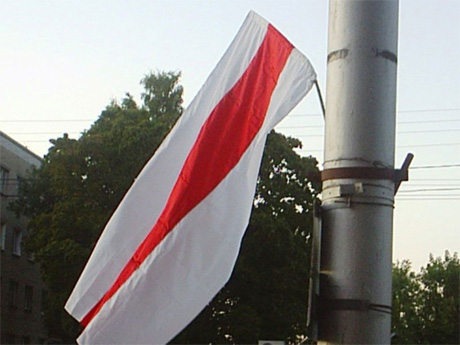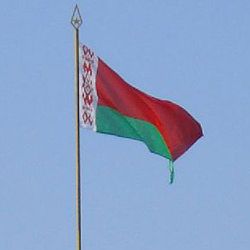On the evening of 3 September three white-red-white flags were hanged in public places of Viciebsk, a regional capital in Northern Belarus. One of them was placed on the building of a local medical university. On a nearby bus stop police arrested the opposition activist Aleh Surhan on suspecion that it was him who had been flying the flags.
In an interview with Charter97 Aleh’s brother Taras Surhan explained what happened: “My brother and I were sitting on a bench at a bus stop in front of the flag. Police officers removed the flag and then they drove up to us. They asked if we saw who had hung the flag and asked to show our identity documents. I had a passport, but my brother didn’t.”
Taras Surhan recalled that after contacting their superiors the police decided to detain his brother. When he refused to go and laid on the ground in defiance, he was “caught, handcuffed and dragged into a police car.” Mr Surhan followed the police vehicle with his brother to a precinct. “I got there 20 minutes later. By then, Aleh’s head was injured. He was bleeding, so I called for an ambulance. It arrived only two hours later. The ambulance staff had called an officer on duty to confirm the call, but the officer on duty didn’t pick up. My brother had asthma. I tried to give him an inhaler, but the policemen didn’t allow me. They watched my brother suffocating and laughed.”
***
 The national white-red-white flag, left is regularly and illegally flown by Belarusian pro-democracy activists on city streets and in public places around the country. In their opinion, this flag is the only true historical banner of Belarus despite the fact that, not counting the Medieval times, it was officially recognised as a state symbol only in a brief period after declaring independence in the 90s.
The national white-red-white flag, left is regularly and illegally flown by Belarusian pro-democracy activists on city streets and in public places around the country. In their opinion, this flag is the only true historical banner of Belarus despite the fact that, not counting the Medieval times, it was officially recognised as a state symbol only in a brief period after declaring independence in the 90s.
 After Aliaksandr Lukashenka rose to power, the 1995 referendum established new state insignia that are almost identical to those of the Soviet Belarus including the green-red state flag, right.
After Aliaksandr Lukashenka rose to power, the 1995 referendum established new state insignia that are almost identical to those of the Soviet Belarus including the green-red state flag, right.
From that time on the white-red-white flag became a symbol of the demand for democratic change in the country. Despite the fact that this flag is not banned from use by any official document, those who demonstrate ‘non-official state insignia’ risk attracting police attention.
***
Aleh Surhan was taken to the Viciebsk regional hospital of at 22:00 that day. Doctors there recorded that he had been beaten, and had injuries to the head and arms. After an hour, the opposition activist was taken to the police precinct under guard, where he spent the night. According to Surhan, the initial report on hanging out a white-red-white flag disappeared. But new reports appeared. Surhan was accused of being drunk and disorderly, using foul language in public and insulting police officers. Aleh Surhan remained at a detention facility until 5 in the morning the following day.
Charter97 phoned Aleh Surhan while he was escorted to the Kastryčnicki district court of Viciebsk. The opposition activist told about the torture the policemen had subjected him to. “I was handcuffed and pulled into a car. I was lying on the floor and policemen were kicking me. At the precinct, policemen twisted my arms and handcuffed me; they hung me up by my belt on prison cell bars. I had to stand on my toes, my arms went numb. Then they beat my head against a lavatory pan, jumped on my head. There were four of them beating me.”
Surhan did not stand trial on 4 September. instead, he applied for an attorney and asked for additional witnesses in his case. Surhan also lodged a motion to instigate a criminal case against the police officers who had tortured him. The judge of the Kastryčnicki district court of Viciebsk Kazimava has postponed the trial until 9 September.


